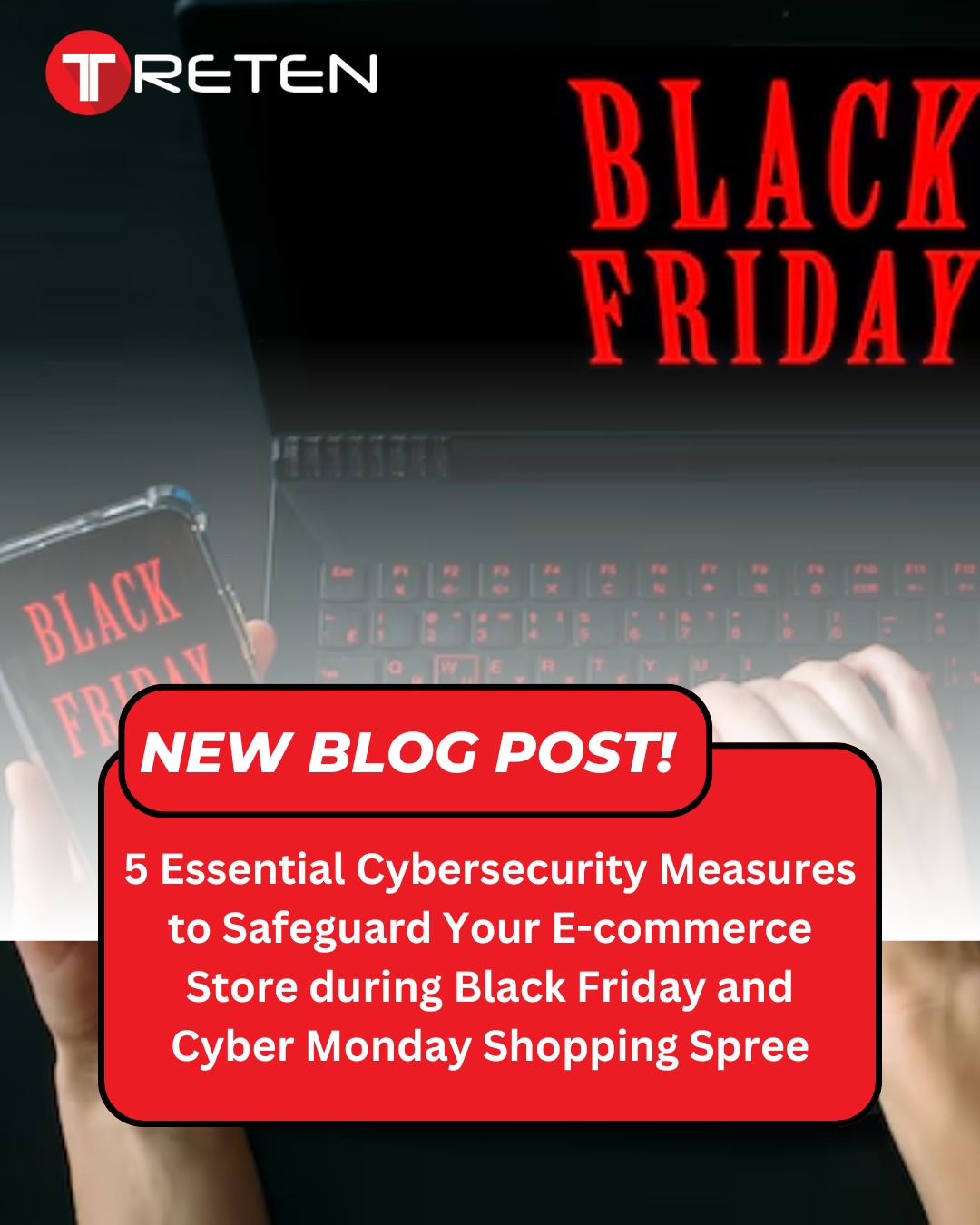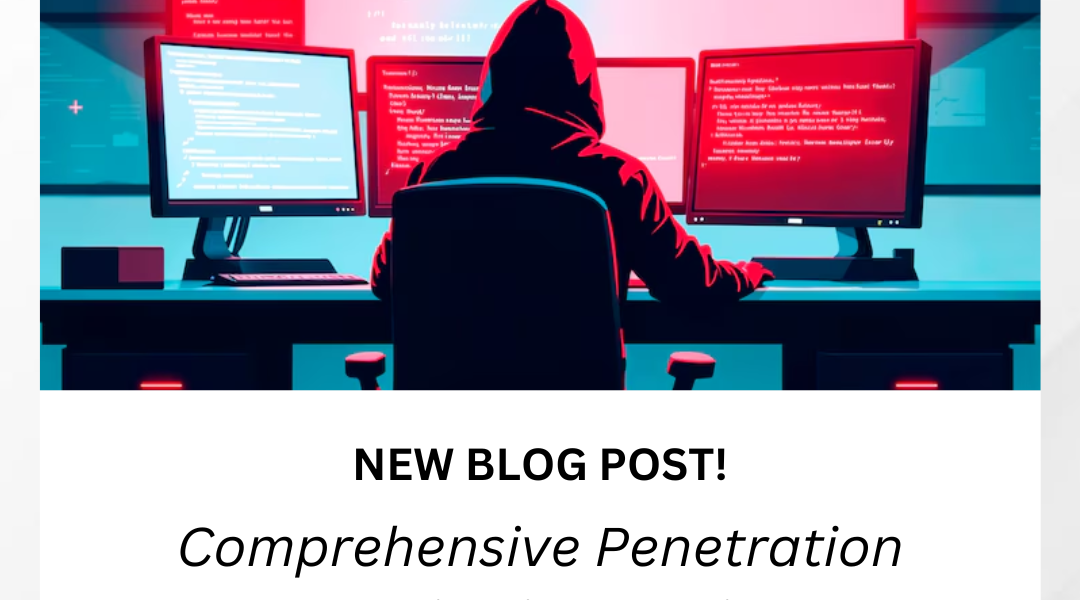5 Essential Cybersecurity Measures to Safeguard Your E-commerce Store during Black Friday and Cyber Monday Shopping Spree
Black Friday and Cyber Monday are two of the most anticipated shopping events of the year, with e-commerce stores experiencing a surge in online traffic and sales. While this translates to significant revenue opportunities, it also presents a prime target for cybercriminals looking to exploit vulnerabilities in online stores. As an e-commerce business owner, prioritizing robust cybersecurity measures is critical to protect your business, your customers’ sensitive information, and your reputation.
This article explores five essential cybersecurity measures you should implement to safeguard your e-commerce store during the Black Friday and Cyber Monday shopping frenzy. These measures, ranging from securing payment processing to educating your employees, will equip you to fortify your online defenses against potential cyberattacks.
With cybercriminals constantly devising new and sophisticated tactics, staying ahead of the curve is paramount. By proactively implementing these cybersecurity measures, you can ensure a safe and secure shopping experience for your customers, fostering trust and loyalty. Let’s delve into the essential steps you can take to shield your e-commerce store during this peak shopping season.
The Importance of Cybersecurity for E-commerce Stores
Cybersecurity is not a luxury for e-commerce businesses; it’s an absolute necessity. A data breach or cyberattack can have devastating consequences, including:
- Financial Losses: You may incur significant financial losses due to stolen customer data, fraudulent transactions, and downtime caused by cyberattacks.
- Reputational Damage: A security breach can severely damage your brand reputation, erode customer trust, and lead to a decline in sales.
- Legal Repercussions: Depending on the severity of the breach and the regulations in your region, you may face legal repercussions and hefty fines.
- Compliance Issues: Failing to safeguard customer data can put you out of compliance with data privacy regulations like GDPR and CCPA.
Common Cybersecurity Threats During the Shopping Season
Cybercriminals are well aware of the heightened activity during Black Friday and Cyber Monday. They leverage this period to target e-commerce stores with various malicious tactics, including:
- Account Takeover (ATO) Attacks: Criminals attempt to steal customer login credentials through phishing emails, malware, or credential stuffing attacks. Once they gain access to accounts, they can make fraudulent purchases or steal personal information.
- Distributed Denial-of-Service (DDoS) Attacks: These attacks overwhelm your website with traffic, causing it to crash and become inaccessible to legitimate customers during peak shopping hours.
- Web Scraping: Malicious actors use automated bots to scrape product information, pricing data, and customer reviews from your website. This stolen data can be used for price comparison, competitor analysis, or even launching fraudulent marketplaces.
- Man-in-the-Middle (MitM) Attacks: These attacks occur when a cybercriminal intercepts communication between your website and a customer’s device. They can steal sensitive information like credit card details during checkout processes.
- SQL Injection Attacks: These attacks target vulnerabilities in your website’s database to inject malicious code. This code can steal customer data, alter website content, or disrupt website functionality.
Essential Cybersecurity Measures for E-commerce Stores
By implementing a layered security approach, you can significantly reduce your risk of cyberattacks. Here are five essential cybersecurity measures to safeguard your e-commerce store during Black Friday and Cyber Monday:
-
Implementing Strong Passwords and Two-Factor Authentication (2FA):
- Enforce Strong Password Policies: Mandate complex passwords for all user accounts, including a combination of uppercase and lowercase letters, numbers, and symbols. Enforce regular password changes (at least quarterly) and avoid password reuse across different platforms.
- Enable Two-Factor Authentication (2FA): 2FA adds an extra layer of security by requiring a secondary verification code during login, typically sent via SMS or generated by an authentication app. This significantly reduces the risk of unauthorized access even if a cybercriminal steals a user’s password.
-
Protecting Customer Data and Securing Payment Gateways
- Store Data Securely: Implement robust data encryption practices to safeguard sensitive customer information like credit card details, names, addresses, and purchase history. Utilize industry-standard encryption algorithms like AES-256 to protect data at rest and in transit.
- PCI DSS Compliance: Ensure your e-commerce platform adheres to the Payment Card Industry Data Security Standard (PCI DSS). PCI DSS is a set of comprehensive requirements designed to ensure the secure handling of credit card
-
Protecting Customer Data and Securing Payment Gateways
- Store Data Securely: Implement robust data encryption practices to safeguard sensitive customer information like credit card details, names, addresses, and purchase history. Utilize industry-standard encryption algorithms like AES-256 to protect data at rest and in transit.
- PCI DSS Compliance: Ensure your e-commerce platform adheres to the Payment Card Industry Data Security Standard (PCI DSS). PCI DSS is a set of comprehensive requirements designed to ensure the secure handling of credit card information.
- Secure Payment Gateways: Partner with reputable payment gateway providers that offer robust security features like tokenization, encryption, and 3D Secure authentication. These measures help protect your customers’ payment information from unauthorized access and fraud.
-
Regularly Updating Software and Patching Vulnerabilities
- Keep Software Up-to-Date: Regularly update your e-commerce platform, plugins, and extensions to address security vulnerabilities and receive the latest security patches. Outdated software is a prime target for cyberattacks.
- Patch Vulnerabilities Promptly: As soon as security patches are released, apply them to your system without delay. This helps close security gaps and prevents cybercriminals from exploiting known vulnerabilities.
-
Educating Employees About Cybersecurity Best Practices
- Cybersecurity Awareness Training: Conduct regular cybersecurity awareness training for your employees to educate them about common cyber threats, phishing attacks, social engineering tactics, and best practices for secure online behavior.
- Phishing Simulation Drills: Conduct phishing simulation drills to test your employees’ awareness and response to phishing emails. This helps identify knowledge gaps and reinforce best practices.
-
Monitoring and Detecting Suspicious Activities
- Implement Intrusion Detection Systems (IDS): IDS can monitor your network traffic for signs of malicious activity and alert you to potential threats.
- Utilize Security Information and Event Management (SIEM) Tools: SIEM tools can collect and analyze security logs from various sources to identify anomalies and potential security incidents.
- Regularly Review Security Logs: Review security logs to monitor for unusual activity, failed login attempts, and other suspicious indicators.
Case Study: A Global Retailer Secures Its Online Empire with Advanced Cybersecurity
The Challenge:
A global retail giant, faced a daunting challenge during the peak shopping season of Black Friday and Cyber Monday. With millions of online shoppers flocking to their website, the risk of cyberattacks, data breaches, and system failures was unprecedented. The company needed a robust cybersecurity solution to protect its sensitive customer data, prevent service disruptions, and ensure a seamless shopping experience.
The Solution:
The company partnered with a Treten Networks of leading cybersecurity vendors to implement a multi-layered security strategy:
-
Network Security:
- Cisco: Provided advanced network security solutions, including firewalls, intrusion prevention systems, and SD-WAN, to protect the network infrastructure from cyber threats.
- Juniper: Deployed high-performance routers and switches to optimize network performance and ensure low latency, enhancing the overall shopping experience.
- F5: Implemented application delivery controllers (ADCs) to distribute traffic efficiently, improve website performance, and protect against application-layer attacks.
-
Security Analytics and Automation:
- NetBrain: Utilized AI-driven network automation and assurance to proactively identify and resolve network issues, reducing downtime and improving overall network performance.
- Infoblox: Deployed DNS security solutions to prevent DNS-based attacks and ensure the integrity of DNS traffic.
- Cellusys: Provided advanced network intelligence solutions to optimize network performance and identify potential security threats.
- Sandvine: Implemented network optimization and security solutions to improve network performance and protect against DDoS attacks.
- Netscout: Deployed network performance monitoring solutions to identify and resolve network issues in real-time.
-
Cloud Security:
-
Endpoint Security:
- Sophos: Deployed endpoint security solutions to protect devices from malware, ransomware, and other cyber threats.
- Skybox: Provided vulnerability management and security assessment solutions to identify and mitigate security risks.
- Palo Alto Networks: Implemented advanced firewall and threat prevention solutions to protect the network perimeter.
- Fortinet: Deployed a unified security platform to protect against a wide range of cyber threats, including malware, ransomware, and phishing attacks.
- Checkpoint: Provided comprehensive cybersecurity solutions, including firewall, VPN, and endpoint security.
-
Data Center and Cloud Infrastructure:
- Africa Data Centre: Provided secure data center infrastructure to host critical e-commerce applications.
- Huawei: Deployed networking and storage solutions to ensure high performance and reliability.
- AWS: Provided a scalable and secure cloud platform to host e-commerce applications and data.
- TelSpace: Provided reliable connectivity and network services to ensure optimal performance.
The Results:
- Enhanced Security Posture: The robust cybersecurity measures implemented by the company significantly enhanced its security posture, protecting sensitive customer data and preventing successful cyberattacks.
- Improved Website Performance: Optimized network performance and application delivery resulted in faster load times and a smoother shopping experience for customers.
- Increased Sales: The improved website performance and seamless shopping experience led to a 25% increase in online sales during Black Friday and Cyber Monday.
- Reduced Downtime: Proactive network monitoring and automation tools minimized downtime, ensuring uninterrupted service delivery.
- Enhanced Customer Trust: By prioritizing cybersecurity, The company demonstrated its commitment to protecting customer data and building trust.
Lessons Learned:
- Proactive Cybersecurity is Essential: A proactive approach to cybersecurity is crucial for businesses of all sizes, especially during peak shopping seasons.
- Invest in Robust Security Solutions: Investing in advanced security technologies and tools is essential to protect against evolving cyber threats.
- Employee Training is Key: Educating employees about cybersecurity best practices is vital to prevent human error-related security breaches.
- Regular Security Assessments are Mandatory: Regular security assessments help identify and address vulnerabilities before they can be exploited by cybercriminals.
5 Essential Cybersecurity Measures to Safeguard Your E-commerce Store during Black Friday and Cyber Monday Shopping Spree
By implementing these essential cybersecurity measures and leveraging advanced security solutions, you can significantly enhance the security posture of your e-commerce store. Remember, cybersecurity is an ongoing process, not a one-time event. Stay vigilant, stay informed, and adapt to the ever-evolving threat landscape. By prioritizing cybersecurity, you can provide a safe and secure shopping experience for your customers, build trust, and protect your business’s reputation.
Contact us today for a FREE CONSULTATION
5 Essential Cybersecurity Measures to Safeguard Your E-commerce Store during Black Friday and Cyber Monday Shopping Spree


